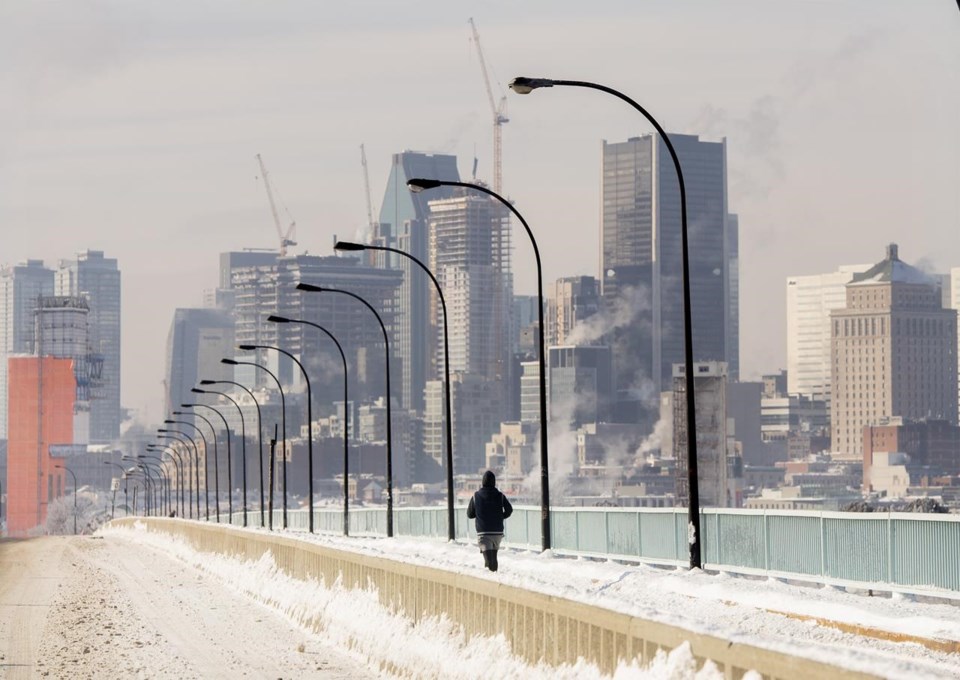MONTREAL — An extreme cold snap that brought risks of frostbite and hypothermia with temperatures of -28 C on Friday in Montreal had the city's shelters fearing for the homeless population.
Environment Canada said the effects of the "vigorous" cold front that was forecast to continue into Saturday with a wind chill making the temperature feel like -40 C would put people at risk.
The City of Montreal this week opened two temporary emergency warming centres for the homeless population, each of which can accommodate up to 50 people between 8 p.m. and 9 a.m. The centres are to close on Sunday. City health officials warned that frostbite can cause permanent tissue damage necessitating amputation of fingers and toes, while they said hypothermia can cause death.
James Hughes, the head of homeless shelter network Old Mission Brewery, said Friday his staff were working tirelessly at the overflowed shelter in downtown Montreal.
"The men's facility is entirely full," he said. "We also run a walk-in service, and we have made sure that it's open 24 hours … It's got a 55 capacity, and we had 75 last night, so people spilled out into our cafeteria next door."
Hughes said there was a citywide effort to protect the homeless, adding that hospitals would not release patients who didn't have a place to sleep.
Marie-Noëlle L'Espérance, director of prevention and intervention with Dans la rue youth shelter in Montreal, said her group tries to accommodate as many people as possible in times of extreme weather.
City officials said there were more than 1,600 beds in Montreal shelters, but L'Espérance said she feared that number wasn't enough.
"Those spaces are already occupied," she said. "The 100 spaces that they just added are welcomed, but we are lacking spaces."
Marina Boulos-Winton, who heads Chez Doris, a women's shelter in downtown Montreal, echoed L'Espérance's concerns.
"The goal is to keep everybody safe. But the 1,600 beds are not enough," Boulos-Winton said in an interview on Friday. "I am concerned about people's mental health."
Quebec was not alone in feeling the bitter cold. Extreme cold warnings were in effect Friday across Ontario, and on the East Coast, temperatures were expected to feel like -40 C across much of the region overnight into Saturday.Â
Nova Scotia Community Services Minister Karla MacFarlane had promised that anyone in need of shelter would be provided a bed, even if the government needed to rent hotel rooms.
In Montreal, the Welcome Hall Mission shelter is open 24 hours and has a capacity of 165 people. CEO Sam Watts said they have a policy of not turning away anyone in need.
"When it's really cold, we have to be extra vigilant that we're working very closely with the entire ecosystem to make sure that nobody has to stay outside."
He said the extreme cold is particularly hard on people living on the streets because they often have health conditions that make them vulnerable.
"We take people in, and we encourage people to stay in," he said. "At the same time, we become extra aware of the medical conditions that people have.Â
"Because as I think you're aware, anybody with a number of comorbidities, in addition to experiencing homelessness, is extra vulnerable to extended periods of time outside. So that's a concern for us, and it just means that we work extra hard in times like this."
This report by The Canadian Press was first published Feb. 3, 2023.Â
—
This story was produced with the financial assistance of the Meta and Canadian Press News Fellowship.
Marisela Amador, The Canadian Press



